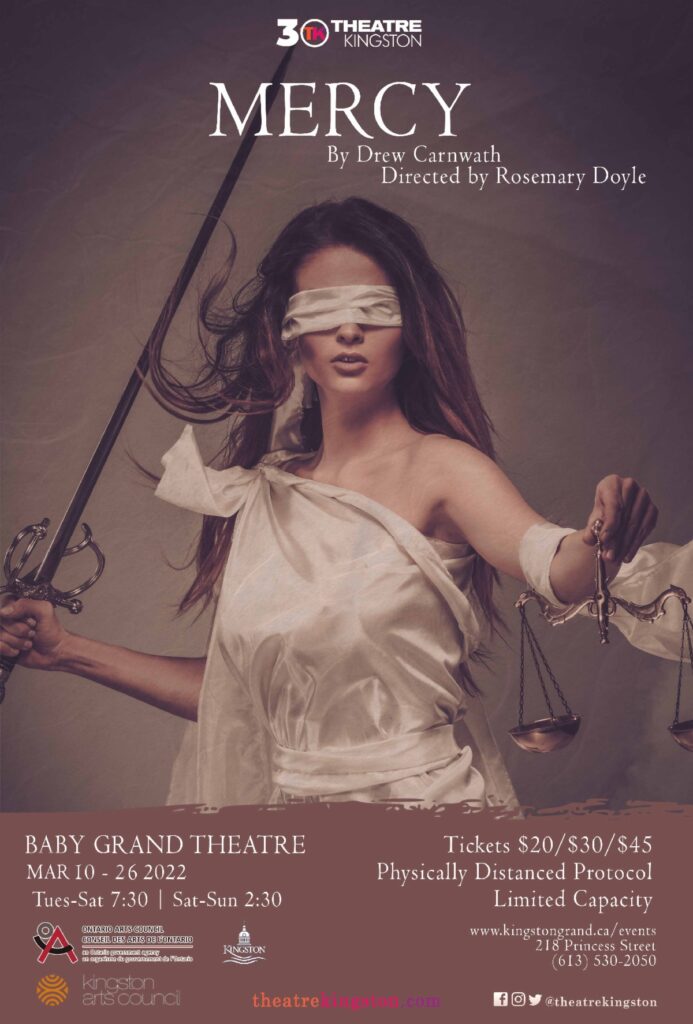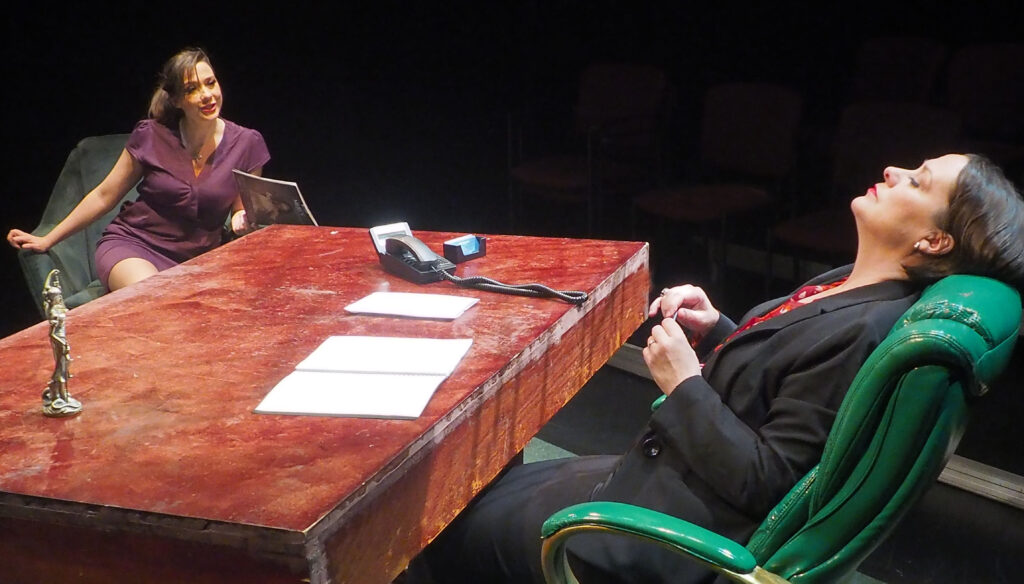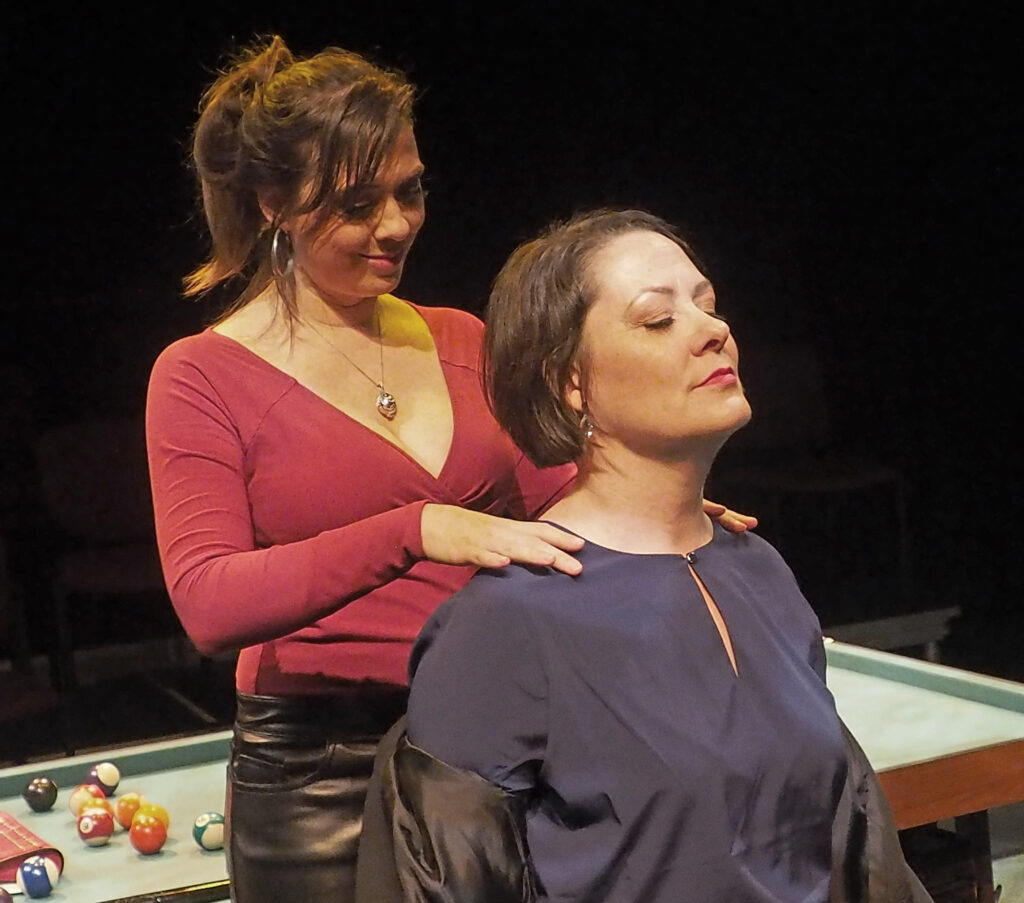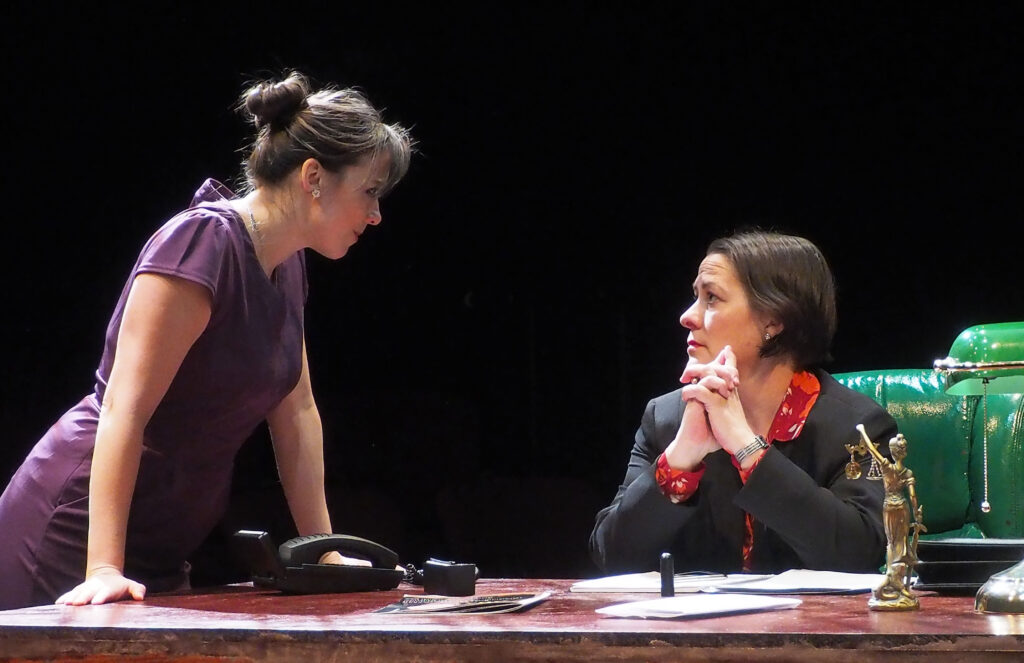Mercy for Whom?

Alt text: The poster features a white woman with a blindfold and dress made of silky fabric, holding a sword and a scale. She has brown hair and stands amidst a brown background. The top and bottom of the poster include the performance information, such as ticket prices, sponsors, runtimes, and location.
It’s March 12. Cindy Ci and Jeff McGilton are speaking on a video call to discuss a play they had watched two nights prior. ‘Mercy’, written by Kingston local Drew Carnwath, is being produced by Theatre Kingston and directed by Rosemary Doyle. The lighting was designed by Tim Fort and the Stage Manager is Anne Marie Mortensen. It is being presented at The Baby Grand until March 26.
The story follows Jordan (Helen Bretzke), a defense lawyer, as she bargains with a high-profile sex worker named K (Tracey Guptill) to seduce her husband, all the while defending a highly contentious case. Through their interactions, we learn more about each character and uncover their true intentions.
These are Jeff and Cindy’s thoughts.
[THIS DISCUSSION CONTAINS SPOILERS]
JEFF: Alright, Jeff and Cindy here, talking about Mercy by Drew Carnwath. To give our readers some context of the plot, the character Jordan comes to K hoping to pay her to seduce her husband, and through their interactions we learn that K is running away from a history of sex trafficking and is an immigrant without legal status. They also burn through a lot of other topics in the process.
CINDY: How do you talk about these large topics of racism, immigration, etc. in a 90-minute play? These are heavy subjects with so much nuance and the experience will be different depending on generation, location, reason… There are countless stories about people coming to America for a better life; I wonder why Drew chose this one to use in this play. I don’t know if there was a succinct conclusion to it, which makes it feel like it was only used for the main character’s story.

(Alt text: The image features Guptill, a white woman with brown hair, wearing a purple dress and holding a magazine. She looks expectantly towards Bretzke, a white woman with short, brown hair and a black blazer, looking tired. Between them sits a desk with some papers, a telephone and a figurine of Lady Justice.)
JEFF: Right! Jordan, when she is not interacting with K, is in the process of defending a young offender who has committed a brutal hate crime against a refugee in order to be accepted into the literal Proud Boys. So there are two stories of people coming to America, or Canada, or wherever this is—one experiencing sex trafficking and the other a hate crime that could end their life.
CINDY: It’s irresponsible for a playwright to only briefly touch on each subject despite its importance to the overall plot. It felt like Drew was trying to explore too many things. This even caught them up when the director’s and writer’s notes were on different topics–one said the play was about women and feminism and the other said racism. It’s not to say that a play can’t have many themes, but a shallow attempt results in a confused audience who is unsure of the play’s purpose. As a woman of colour, it felt like the hate crime was decorative to the white woman’s success, because we never see or hear any resolution of the lawsuit. But we do see Jordan drop her client’s case after being cornered by K, which signified a change to Jordan’s career.
JEFF: Yes! The only plot that gets resolved is Jordan’s. Everyone else in the story is left in limbo. Taking quick pokes at them feels a little careless, and the lack of exploration does the characters an injustice. Also in his notes, Drew wrote about the two main characters, “It won’t be an easy victory for whoever emerges the winner.” I mean, were they pitted against each other? Is that what this was? A contest of woman versus woman?
CINDY: I could not say if I saw that but if someone did I can’t argue against it.
JEFF: I would actually love to know what kind of care went into the behind the scenes work as well. Were there talks about the realities of human trafficking, or space to unpack the themes of assault? How would the show have been different if Theatre Kingston or Drew had been in conversation with the Kingston Sexual Assault Centre, or the Kingston Immigrant Partnership? Was the using of these themes in what feels like a side plot really necessary?
CINDY: I also wonder, then, what is necessary for them to show? Like the backstory for K’s character is shown through an explicit scene where we hear the trauma of a young woman being forced into sex trafficking and see K wrapped in bed sheets pleading to above. I wonder what that added to the story and whether it needed to be shown in that way. Sex and violence on stage that’s done without any creative abstraction can get very real for the audience if it’s presented straight on. If the purpose was to make people uncomfortable, it worked, but I don’t know if that discomfort made me learn anything. Well, it made me not want to be sex-trafficked but I feel like that is not a new thought.
JEFF: When do playwrights or directors need to be questioning why they’re doing this to the audience? In Act One, Jordan uses K’s undocumented status (which is rooted in sex trafficking) as a threat. Imagine moving to Kingston from another country and watching this scene of deportation being wielded against K! What feels worse is that there was no indication that the show would include themes of sexual assault, human trafficking, or hate crimes, but they were all there. I actually don’t even know if there were any content warnings at all. I could have brought my eight-year-old.

(Alt text: The image features Guptill, a white woman with brown hair in a ponytail and hoop earrings, wearing a red top and leather skirt. She is giving a massage to Bretzke, who is a white woman with short brown hair, wearing a navy blue top. Both look at ease. Behind them is a pool table.
CINDY: Do you remember those information packages from when you were in school? Like whenever you have a field trip to go see a show? I really wished I had something like that. I’m sure there were good intentions and thoughts behind this production, but I just feel like it didn’t translate well when it was put on stage. It’s hard to teeter that line of making something too obvious without it being cliché or ambiguous to the point that it doesn’t leave the audience with their own thoughts, but only confusions.
JEFF: It did feel like the intentions were there, especially in aspects other than the script. I thought Guptill and Bretzke both gave good performances, and Clelia Scala designed a beautiful set. The stage was set in a triangle, which was something I don’t think I’ve ever seen before. It made for really great moments whenever a performer would plant and deliver on one of the triangle’s points, and it made me think of the hanging scales of Lady Justice. There was also a fabulous moment where a pool table was covered and became a desk, as well as a bed. I may have questions about what happened on the bed, but a great transition for sure.
CINDY: The conclusion was also very… unsatisfying? It ended with Jordan just leaving the case, prompted by K cornering her. If Jordan had decided to take action without K’s influence, would she have a higher moral standing? What if she decided to aid the foster care system by providing legal help to organizations that better conditions of foster children? It just felt very empty for the both of them.
JEFF: That would have been interesting! Or decided she would help K with her citizenship and others like her. Even if Jordan was swayed to ‘do the right thing’ without the use of blackmail, the hate crime still would have happened and the trial still goes forward. Both Jordan and K get to brush the dust off their shoulders while the two boys affected might never recover. Maybe that was actually the intention of the play, to showcase the dubious effects of a white feminist mindset?
CINDY: Conversations about feminism and increasing awareness of subjects like sexism in the workspace or sex trafficking are not ones that only white women should tackle; because they impact everyone. And the way Mercy presented the playwright’s opinion through the female characters felt like a concealed ‘mansplanation’. There were aspects of the script that made it clear to me that I was listening to a man’s words coming from a woman’s mouth. I also could not understand when Jordan said, “would you care this much if Sammy was white?” I don’t know if that even got answered, but it was put out there, so why was that put out there? Do you want us to question it or not? Nothing came from that conversation—it was just a what-if scenario.
JEFF: Language is incredibly important to showing the thought processes of a writer. The whole time onstage they used ‘prostitute’ versus calling her sex worker. It’s a small change to some, but big to others. You know, this is their work and this is their livelihood. Calling it sex work is a way to say that this is a kind of work, and you know, it has a place in society. It has for years. Before we’re even asked to meet this person, we’re already being fed misguided assumptions of what sex work is. It’s not giving us a new perspective–this is something that you maybe could have watched in an episode of Family Guy. It almost feels like you’re making a caricature out of very real issues.
CINDY: Did this play change anything about your thoughts on refugees fleeing violence?

(Alt text: The image features Guptill, a white woman with brown hair that is tied into a bun, wearing a purple dress and leaning over a table towards Bretzke. Bretzke who is white with short, brown hair and a red shirt beneath a black blazer, looks back. The chair Bretzke sits on is green and on the desk there lies papers, a lamp, a phone, a USB drive, and a figurine of Lady Justice.
JEFF: Not really. I think it brought it to light. Given the geo-political times we find ourselves in, mass displacement is huge. I think that a really good play afterwards makes you want to do something or makes you think, ‘oh my God, there’s no way that I can ignore this, because it continues to happen.’ In the end, taking the story away from what happened to the Syrian refugee and this Proud Boy and putting it in the hands of this powerful lawyer woman, we don’t have that moment. Instead we have, ‘oh, she’ll never make partner, but she did the right thing!’ Maybe this is a situation of trying to do so many stories at once that they don’t do one really well.
CINDY: A racial injustice was the backbone needed for a white woman to decide to… not support racism. There’s an assumption that racism and sexism don’t intersect, but they often do. What was on display for us to watch was A-plot sexism, B-plot racism.
JEFF: Just because you can show a nuanced perspective of the situation doesn’t always mean you should do it.
Mercy by Drew Carnwath is presented at The Baby Grand through Theatre Kingston from March 10-26. If you are interested in getting a ticket, click here.
